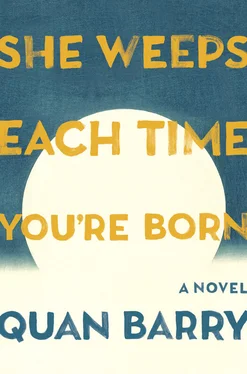In less than a week they’d built two barracks. The floors were dirt, and they were told not to hew any windows into the walls. The hardest part was cutting down the trees miles away in the jungle and dragging the logs to camp. They didn’t understand why they had to use trees from so far away, but they didn’t question it. The first night the men slept in the new barracks, the guards came around and bolted the door. By the end of the night the heat of fifty men created condensation on the roof, and the ceiling began to drip. There was a plastic bucket in the corner. In the long night if one of the men suffered from runny stool, it smelled as if they were all wallowing in it. Nobody said anything because they knew in time it would happen to them.
During the day there were various teams of twenty. Building was the best assignment. After a few weeks an architect arrived in one of the trucks, but the guards didn’t care. Nobody is better than anyone else, they said. One of the supply sheds collapsed during a thunderstorm. For a while two of the barracks looked rickety until the men shored it up at the urgings of a newly arrived engineer. Even when someone needed medical attention, the guards didn’t turn to the numerous doctors in camp, three of them surgeons trained in France. When a man accidentally had two of his fingers cut off with an adze, he died within the week from a combination of infection and blood loss.
Clearing and logging were among the worst tasks. Each group had a daily quota. If you didn’t make it, your group got less of the sandy red rice they served for dinner. It was just an excuse to feed them less. Everyone knew the loggers would never make their numbers. The trees they were expected to fell were impossibly old, many as tall as city buildings, the jungle so dense you didn’t know what would happen once you brought one down, how it would fall, what it would bring down with it. Their tools were inadequate — hand axes and some rope. One of the men was an old fisherman who had been denounced by one of his sons’ wives because he had willed his boat to another son. The second week, the man was crushed by a falling tree. The worst part about it was that he was alive the entire time as they tried to get the tree off of him. He kept asking for water, but there was none to give him. It took all of them to move the trunk a few inches so that one of them could slide him out, the blood welling in his extremities, legs puffed up big as tires. When they got him out at last, the men cheered. Then he died.
For the first month An worked logging. It became more dangerous when one of the groups discovered that the river was the only chance they had to even possibly make their quotas. It took six men to carry a log the half mile to the river. Then they would throw it in and tie it up. When they had six logs in place, they would let them go. Each man was tied to one, logs round as fifty-gallon drums, the inner wood pale as sand. It was each man’s job to guide his log the two miles downriver, making sure it didn’t get snagged. It was dangerous, because you could get caught up in someone else’s rope. There were also places where the trail they’d hacked became treacherous, the jungle growing so fast they had to constantly cut it, or one day there might be a vine or a root that wasn’t there the day before. Sometimes if a log got swept away in a current, you could be pulled into the river before you had a chance to cut yourself free. When it happened, you were dragged who knows where, maybe all the way out to sea, your body washing up onshore a thousand miles away. The worst part was the place they had chosen to pull the logs back up on land. It was the closest spot to camp, but the waters were strong. Every week someone got pulled in somewhere along the route, his body battered among the logs. Depending on where you got pulled in, you might survive with several broken ribs, though more likely your throat would be crushed.
After three months Trinh Thi began to look like a camp. There were ten barracks, each housing fifty to one hundred men. There were houses for the guards, a proper kitchen, a small medical clinic that was used sporadically, mostly when a government official was coming to visit or when a place was needed to store someone until he died. There were two other buildings, which they used for interrogations. Every time you were interrogated you were handed a yellow legal pad and told to write out your confession. The men who couldn’t write were told to draw. If they couldn’t draw, then someone was assigned to write it down for them as they spoke. They all began to look forward to the interrogations. Written confessions could stretch twenty, thirty pages, a good three hours, an uninterrupted period of time when you weren’t working in the jungle, a moment of privacy. After a few weeks they began to add literary flourishes. The Americans’ soulless eyes pale as opals. The plane with its trail of white fire screaming through the air. The northerners brave as hornets. Ho Chi Minh with his capacious love deep as the ocean.
Once the land had been cleared, they began to plant things. The months before their first harvest, at lunchtime they would eat whatever they could find. Wild berries. Animals the traps they’d set the night before had managed to catch. Patches of tapioca left by northern soldiers who had traveled for years along the tapioca trail running north-south along the Cambodian-Laotian border. It was how the NVA had managed to penetrate the length of the country. Each time a soldier pulled up a root, he would plant two tapioca seeds in the very same spot for the next soldier coming through, the plants both nourishment and a trail marker. A whole army had traveled south on tapioca and nothing else.
They would work from sunup to sundown. At the end of the day the men out in the farthest quadrant felling the trees had to stumble home in the dark. Then each night after their dinner of rice and fish sauce, the red sand in the rice slowly grinding their teeth down, they would attend a meeting. Often the meetings were self-directed. Each group had a leader, someone the guards randomly assigned. The team leader’s job was to keep count of the tools, make sure each ax made it back into the shed. Mornings he double counted, confirming that everyone was in line by six. Nights the group leader kept them on topic. What were your errors, brother? In the future what will you do right?
For the most part they would sit around a small fire and try not to fall asleep. The mode was confessional, the favored form the self-critique. You had to talk about your daily performance, your work in the jungle, the reasons why capitalism would fail, the shadows that lingered on the surface of your heart. Often someone was assigned to give the daily reading. A citizen recognizes that a society is only as good as its citizens. A son must love his country first, his father, and then his mother. The meeting always ended with the singing of a patriotic song. An missed the old songs, the love songs about schoolgirls with flowers trailing the length of their white ao dai . They sang out as loud as they could. There was a constant worry about moles. You had to go through the motions, look as if you meant every word.
Ba, said Son on the roof of the pilothouse. The rain was beginning to come down harder. The moon had been utterly erased from the heavens, and the winds were picking up. Soon they would have to go below deck. Say something. An felt the water on his face. Where was he? How could this be happening? Everything he’d ever wanted for the last four years was right here on this flimsy boat in the middle of the South China Sea, which was about to turn on them. How could he have gotten this close? We never laughed, An said. I never remember laughing.
Some days, right before an official visit, they were allowed to write letters. They were each given a square of rice paper the size of a man’s hand, the thing fibrous and tough, and told to share pencils. Most of the men wrote to say they were alive and somewhere in the highlands. They asked their families for letters in return, clothing, cigarettes, a better knife. They knew the guards were reading, so they kept it simple. Once a man was scolded because his love for his wife was deemed improper. He had used the word beloved six times on his small sheet of paper. After a while they all knew their letters didn’t go anywhere. One man found his flapping in a bush beside the river with excrement smeared on it.
Читать дальше












